Sign up now to get our Daily Breaking News Alerts
Developers reveal new designs and ‘pedestrian emphasis’ for six-block, eight-acre mixed-use Buckhead project.
OliverMcMillan, the new developers of the Streets of Buckhead, now called Buckhead Atlanta, is days away from applying to the city of Atlanta for its first permits to begin construction on the Buckhead site it has owned since June (the site has set vacant for several years).
Paul Buss, president of the San Diego-based real estate firm that develops urban and mixed-use retail, told What Now Atlanta at a press conference Thursday, Buckhead Atlanta will offer both high-end and mid-level retailers. The original project called for high-end Luxury retailers only, like Hermes.
Hermes, a luxury clothier that had signed on for the Streets of Buckhead originally, is the only confirmed Buckhead Atlanta retailer at this time, he said.
Nearly 2,200 parking spaces (revitalized from parking decks built for the Streets of Buckhead) have been carefully added to Buckhead Atlanta’s master plan, though OliverMcMillan hopes to leverage its $13 million landscape budget to encourage pedestrians.
Buckhead Atlanta is scheduled to be complete in 2013. We’ll have updates on the development’s retail and restaurant offerings when the information is available.
Here are the latest renderings for Buckhead Atlanta:

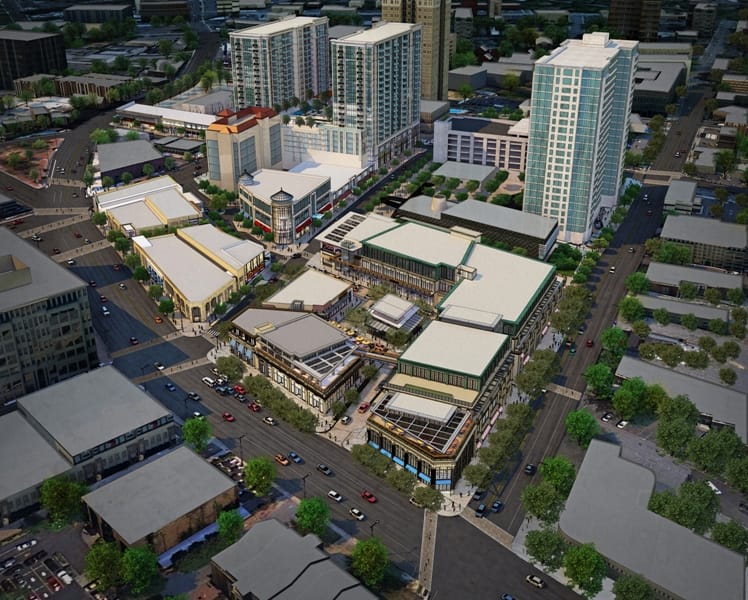
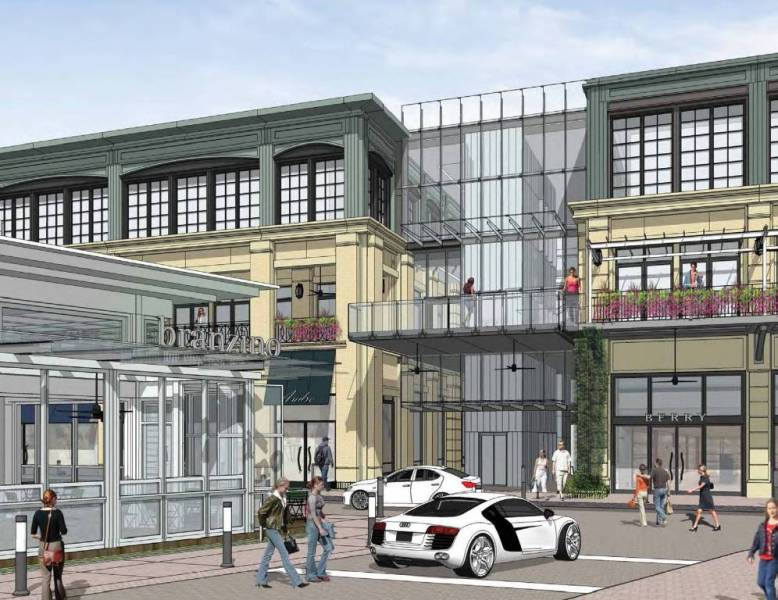
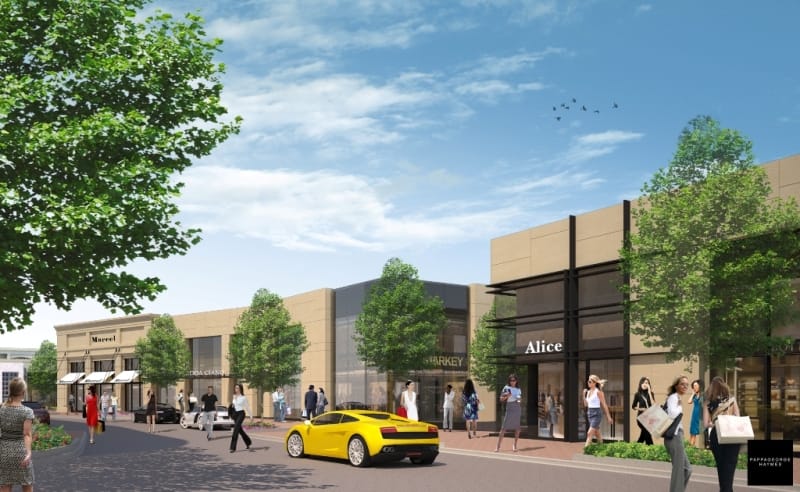
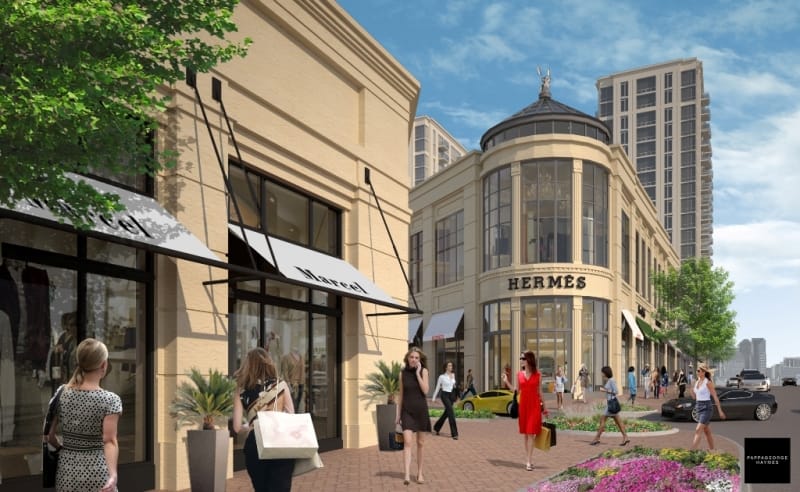
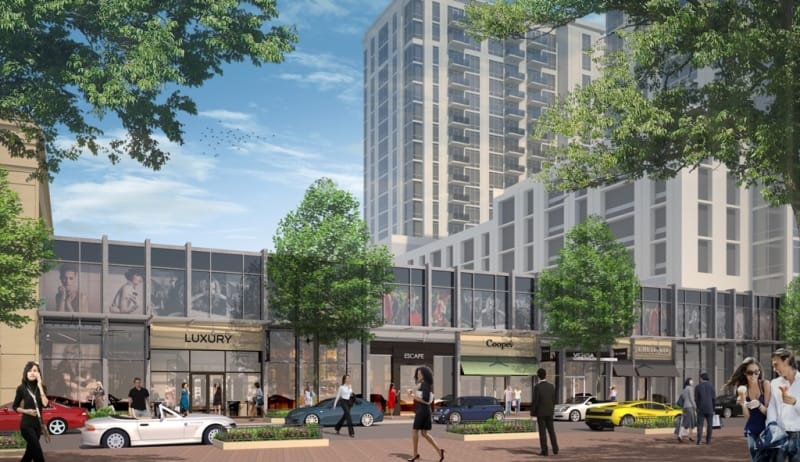





42 Responses
Push, push, push that vision into the future. I bet Sam Massell is getting kinda nervous…oh wait, as long as their aren’t clubs then a perpetual construction site is just fine…I forgot.
I love the vehicles in the renderings so inspirational, can’t wait to shop, eat, and play there (oh wait no play).
Wow are they seriously letting cars into that internal space (lower right corner square). That should be an entirely pedestrian area, there is no need for cars to pull through that area. That is very disappointing.
The architecture is fairly bland, but maybe it’ll be better than the schlock built in Atlantic Station. Or not. Renderings rarely convey the quality of the end project.
It looks like it’ll be a pleasant place to walk and window shop. I don’t have my Ferrari yet, so I guess I won’t be driving in…
This should all be in midtown. Buckhead is a suburb.
Yeah… haha the cars are a bit ridiculous, but hey it’s a rendering why not have fun? Inman Parker: The success of this development is imperative to the improvement of the economy and quality of life in Buckhead. Hopefully it will help the village area become the heart and soul of the community by offering dining/retail at a more personal level than is currently offered in Buckhead. Lenox Mall fails at that miserably.. As far as Buckhead being a suburb, while technically it is in the city limits, it pretty much could be a city on it’s own. So what? Instead of putting all the districts of Atlanta against each other, why don’t we just look at it in a different way. Midtown feeds off Buckhead, Buckhead feeds off Midtown, Virginia Highland feeds off Inman Park, vice/versa… they are all puzzle pieces that make up this vibrant and cosmopolitan city. I am fond of all of them.
Some of the architecture looks good – top photo reminds me of a faux SoHo loft (considerably shorter though).
My initial thought is (i) Not even remotely dense enough. 2-3 stories with a couple of mid-rises in the back? It reminds me of the Forum in Norcross. (ii) There’s nothing wrong with mixing the luxe and mid-range tenants, but I’m almost certain that the mid-range tenants here won’t be local, they’ll be Banana Republic, and other massive chains, which will deplete any individuality…should work fine in Buckhead. I mean, the name is so creative as it is. (iii) The only parking that should be allowed here is street parking. They should make NO accommodation for additional parking.
(yawn)
@Urbanist – I would love for it to be more dense as well but I’m not sure they would be able to get funding to build anymore than they are trying to build now and I imagine that high rise condo developers are not beating their doors down right now either. Some luxury apartments may work but it’s even risky for those developers.
As far as local tenants, I again agree that more local tenants would be preferred but I’m sure the lease rates are going to be through the roof which takes most local entrepreneurs out of the picture. Not sure it would be a worthy investment for local entrepreneurs anyway. A 2nd Sid Mashburn store may do good here though.
I hope you are kidding about the parking. If parking is an issue at all in Buckhead then it will have no chance to succeed. Period. Over half of the demographic that’s going to be shopping here are Buckhead Betty’s and regional shoppers used to big malls….trust me, they aren’t looking for street parking in their fancy cars. Midtown is barely getting used to limited parking (which isn’t even that limited) – Buckhead is a completely different animal.
They could have built just as much on a smaller footprint, and developed the remainder of the site when there was a need/additional demand.
I don’t know that the lease rates will be the absurd. Keep in mind that this was a hole in the ground for two years, before being acquired at a thick discount. The basis is much lower, which requires lower rents to meet any return hurdles. The fact that they’re opening it up to “mid-scale retailers” makes that clear.
I’m not kidding about the parking at all. At some point, some developer is going to have to develop a project that tells the population “this is urban, this isn’t the same suburban bullshit that you’re used to. If you want to drive here to shop, you’ll find somewhere else to park, but I’m not going to waste space and dollars so that you can drive your fat ass 1/2 mile down the road to buy a sweater.”. This city could use a lot more time walking/biking, and a lot less driving.
Also the types of people pictured aren’t realistic. In San Diego this might do well, maybe in UTC. But Atlanta is nothing like this– It will be “bling” within 3 years. Look at the history of what you’ve bought, it was shutdown for a reason.
And no, it’s not really the developers fault. Just like with Atlantic Station It’s simply the people of Atlanta.
2013, huh. Suuuuuuuurrrrrre.
At last, Atlanta is finally getting an Alice boutique!
Hopefully atlantic station v2.0 works better in this location as opposed to v1.0 floating on it’s own urban island…
Speaking of buckhead shopping… anyone know details on the huge addition to the The Shops at Lenox? Was over there for the first time in a while and was surprised to see quite a large structure added next to Deka.
I think if there is an aesthetic template to a strip mall, that is it. I really like the architecture and incorporated landscaping they did over there.
^Probably the Crate & Barrel relocation.
C’mon Urbanist, that is asinine. It sounds all good and everything, but Atlanta doesn’t have the public transportation or residential density for something like that.
No one is going to walk a mile from Marta to this place. 90% of the people coming will need a place to park.
buckheadkiwi,
I disagree. This city will be average as long as everything is spread out. Until we improve the core (inside the area that is being considered for the beltline), this is going to be a sub par city for quality of life. Traffic, crime and lack of overall vibrancy are direct results of sprawl, in my opinion.
@ No Parking – You’re partially right, part of it is just wishful thinking on my part. However, this is a perfect example of how even the urban development patterns in this city are incredibly destructive to the long term future. It seems like nothing in this city happens organically, but rather as a part of massive installations that take years to actually find the appropriate supply/demand balance.
Instead of building one mid-rise apartment building, or one-office building, with ground floor retail space, we build entire massive, master-planned, multi-block, mega-developments, and there isn’t demand for it. We could have gradually built a handful of apartments, densely packed together, with ground-floor retail, allowing people to gradually move in, gradually make the street scene more vibrant, and gradually built a real demand for new businesses Instead we built millions of square feet at Atlantic Station. Instead we built “12th & Midtown”. Instead we are building “Buckhead Atlanta”. Instead we’re drawing up plans for “The Gulch”. All, while knowing that these type of developments simply don’t work. It is the most ridiculous case of “I know this is wrong but I’m going to do it anyway” activity I’ve ever seen.
This inability to learn from our mistakes, make changes to our development patterns, avoid becoming a more car-centric environment, and stop the sprawl, is what led Atlanta to shed more jobs than any other metro area.
Of course, there are going to be the Atlanta faithfuls who, instead of waking up and seeing how detructive this is, somehow find some perverse way to justify it all.
Ladies and gentleman, once again The Urbanist Show!!!!! …Our apologies if it is as boring and repetitive as before, but he has no other life.
“This inability to learn from our mistakes, make changes to our development patterns, avoid becoming a more car-centric environment, and stop the sprawl, is what led Atlanta to shed more jobs than any other metro area.”
I’m not disagreeing with your idea of making changes to our development patterns, but if that is so why are places like Dallas and Houston adding more jobs when they are just as car-centric and sprawling as Atlanta? Dallas and Houston are not vibrant, walkable cities with lots of street life. Atlanta, despite its short comings, is more vibrant than both Houston and Dallas. I don’t think this has anything to do with why Atlanta is shedding so many jobs. I think it has more to do with lack of significant investment in our infrastructure over the last 10-15 years… and that is the state’s fault.
What is the point of all of you (negative) people posting these *intelligent* comments on this blog? Why don’t you put these ideas somewhere that can create change?
@ Mike – I don’t disagree that our infrastructure is antiquated, but I think we might have differing ideas as to where improvements should be made. Regarding jobs, I would imagine much of the job growth in Houston, and perhaps Dallas to a degree, is related to the resurgence of energy as a sector of interest. Perhaps people are looking at Dallas the way they looked at Atlanta 10-15 years ago.
@ Mark – I’ve tried to get in front of our city officials a number of times and have never gotten a response. I’ve tried to get in front of Beverly Scott, who actually responded to my call, but then went radio silent when I suggested meeting to discuss public transportation in Atlanta. I’m doubtful that the bottleneck is at the people with ideas, but rather at the complacent officials.
I also think that car access should be limited to the perimeter of the development, leaving the inside pedestrian-only (with, of course, the required access points for emergency vehicles).
Have you seen the way people drive at Lenox? Just sit in a chair in front that Starbucks at Macy’s for about 10 minutes one Saturday. You won’t believe how many people are too busy talking on the phone to pay attention, think they’re too important to let pedestrians cross at a crosswalk and too ignorant to know what to do at a four-way stop. Those very same people are going to be at “Buckhead Atlanta.”
Besides, the streets going through there will be a magnet for immature dorks driving around in circles, trying to make sure everyone sees their car and hears their stereo, which means they’ll be backed up with traffic every weekend.
Before comparing to cities such as Dallas and Houston, the job loss numbers have to be looked at with a bit more scrutiny. It has been well documented that the jobs being created in these locations are mostly service and retail jobs. The type that do not create additional jobs, wealth, or long term viability. And even if the jobs were mainly in energy, they would be in oil. A technology, that maybe not today or tomorrow, is eventually on its way out. So the cities may be creating jobs in the short term through that, they will end up much like Detroit with auto manufacturing, and Charlotte with banking, if they focus solely on one industry. Detroit and Charlotte both have uenmployment numbers significantly higher than Atlanta’s.
The job losses in Atlanta mainly stem from two sectors, construction, which everyone is struggling with, and government, which our republican run government wants to reduce. Construction will continue to struggle in Atlanta because it was over built, mainly from suburban development. The same thing is happening in Charlotte, and it will eventually catch up to places like Houston (who has no zoning or planning limitations) and Dallas. It always catches up.
Rather than negativity we should focus on being more creative to solve this jobs issue in Atlanta. More focus on regional and local entreprenuers and business creation. Essentially, as a society, we got ourselves into this mess with our overconsumption and irresponsibility, so we should use our ingenuity to get out of it.
@ BC – but service and retail jobs would indicate that there are new businesses being created or relocated. For example, I own a boutique, or a stationary store, or a bookstore, or a restaurant. I open it, and hire 10 new people to help run it. I’ve created ten retail/service related jobs, based on the fact that there is a demographic that can support my new store/restaurant. It’s indicative of economic growth.
Second, people have been proclaiming the end of oil for decades, if not longer. Not to mention that most of the major oil companies – the ones located/expanding in Texas – are expanding into shale and other forms of energy. It would be naive to assume that there would be an energy revolution, and BP, Exxon, Marathon, etc. wouldn’t be a part of it. It’s also just completely incorrect to claim that the energy related jobs that are being created are similar to auto manufacturing jobs. Many of those Houston/Dallas jobs are white-collar jobs – traders, analysts, engineers, etc. – not rig workers. Those are the jobs that support the retail jobs that are being created.
I really don’t think there’s any major city in the country that can be compared with Detroit. It’s a town that has not reinvented itself to keep up with global progress – much as a result of the stodgy industry giants that carried so much sway. The auto industry is not like the energy industry, at all.
So, back to Atlanta. Construction job losses are primarily due to the speculative boom in construction that engulfed the metro area. A boom that would have been considerably more tempered, had the sprawl that has come to define this “metro area” been contained. As far as the government related job losses – I can’t really complain. There is so much fluff in government and none of it is doing this city any good. If the city were making great progress, and adding jobs/employers/residents, but our government were a little over-employed, that would be one thing, but that’s not the case.
It’s my opinion that solving the jobs issue goes hand in hand with solving the urban issues we have. Employers want to be near people, businesses need to be near people. The more spread out people become, the less attractive an area is to an employer, a business, and a lot of young, educated people, who want to go somewhere vibrant. I don’t think most people graduate from undergrad, and say “Man, I can’t wait to get out of college, so I can move to Alpharetta, and have a big night out at Cinco’s once a month, with a shockingly homogeneous crowd”. Rather, they say “I want to get out of here, and go somewhere with great opportunity, where I can mix with and meet diverse and interesting people, with creative thoughts, who want to do something really monumental with their lives. I don’t need a big house now, maybe not even a car if I’m lucky. What I need is a small apartment to lay my head down at the end of an exhaustive day of working and socializing. Then, when I’ve actually done something with my life, maybe I’ll decide to move somewhere more quiet to raise a family, etc.”. Those are the type of people we should, as a city, be chasing.
“”Instead of building one mid-rise apartment building, or one-office building, with ground floor retail space, we build entire massive, master-planned, multi-block, mega-developments, and there isn’t demand for it…We could have gradually built a handful of apartments, densely packed together, with ground-floor retail, allowing people to gradually move in, gradually make the street scene more vibrant, and gradually built a real demand for new businesses Instead we built “12th & Midtown”. “”
Uhh, you do realize that long before “12th and midtown,” that Colony Square was built? That is one office building and hotel, right? And after that, the first Mayfair tower was built. That is one apartment building, right? And after that the Park Vue was built? That is one mid-rise apartment building, right? And then the Campanile? That is one more office building, right? And etc. etc. So what is this nonsense you are trying to say about 12th and Midtown? That a developer shouldn’t develop more than four projects in one neighborhood in a six year period?
“””It seems like nothing in this city happens organically, but rather as a part of massive installations that take years to actually find the appropriate supply/demand balance.”””
This coming from someone who is so desperate for complete development in Midtown that he wants the city to literally pay developers to develop(or he wants the city to buy land at a mark-up, and then sell the land to developers at a loss)… That’s what you call ‘organic’ and ‘gradual,’ right?
(Dont get me wrong, I agree that the recent rapid rate of development in Midtown has not necessarily been good for the long term, and that more gradual development is better. But you constantly complain about dead lots to the point that you think the city should spend its own money to encourage even more rapid development. That is the opposite of gradual and organic. So I think you got confused in your diatribes somewhere).
“”we build entire massive, master-planned, multi-block, mega-developments, and there isn’t demand for it…We could have gradually built a handful of apartments”…”
And I’m a little confused who you mean when you say “we build” and “we could have built.”
You didnt build anything. “We, the people” (as in the city of Atlanta) didn’t build anything. Private companies built these. Not sure what your problem is here.
And Midtown has been getting built up organically and gradually. You are the one complaining about ‘gradual.’
————————————–
“”I’ve tried to get in front of Beverly Scott, who actually responded to my call, but then went radio silent when I suggested meeting to discuss public transportation in Atlanta.””
Hi, this is Urbanist, you might know be. I am the most prolific commenter on whatnowatlanta.com, I would like to schedule a meeting to discuss public transportation in Atlanta. Yes, the blog. What Now Atlanta. It is a blog.
I’m shocked she didnt cancel her schedule and meet with you. I assume before directly calling up the CEO of Marta you also presented your transportation ideas in the public meetings that were held for the Comprehensive Transportation Plan?
@Urbanist
I had attempted to include a commentary similar to yours regarding sprawl, but this comment board kept getting an error.
I totally agree regarding the speculative boom and the construction industry. The unchecked sprawl had horrible effects on the building industry. Thats why the majority of say architecture jobs are found in cities with much more controlled growth (NYC, Boston, Chicago, Philly, Seattle). I also agree that economic growth is completely tied to smart growth and urban growth. I dont know of any people coming out of college who are dying to get into the suburbs, they all want to be in the city. Transit will play a major role in that, and I think in your earlier comment of attempting to speak to city officials is a great idea. I dont know about speaking to Dr. Scott though. Not that Dr. Scott and MARTA dont play a role in it, but their abilities are limited thanks to a poor funding structure, lack of community support (particularly the outlying communities) and overall misinformation.
Though I hate the term grass roots movement, it is exactly what is needed to get more intelligent growth and transit expanded. MARTA wants to expand, MARTA needs to expand, but until the right funding is given, and all communities get behind the notion of mass transit there is only so much the authority can do. We have to start with the citizens and the elected officials (local; state and federal officials cant do anything that results in immediate impact). It goes back to this project presented here. There needs to be more people voicing their opinion that the parking and overall diminished pedestrian qualities need to be improved in order to create a more compact vibrant urban atmosphere. Introducing “cruising” or “show lanes” as this project does, cutting through the center of it, is not changing anything.
A lot of people have been proclaiming the end of oil for a while. I am not saying we will just wake up and it will be gone, it will be a progressive march towards unsustainability. We are already on it. Our fuel costs are much more than it use to be, and you have 3 emerging markets that will increase the demand on it. Shale is not the answer because the amount of energy going into extracting that, nearly offsets the output. If you look at the serious commentators and geologists on the subject (who arent predicting the end of it next month, but have been able to forsee all the problems we are starting to feel, even down to the very year) they have been right on point as to the path we are heading. I would suggest checking out the film “End of Suburbia.”
And yes if 1 person starts a retail business they might hire 10 people. But only 1 out of the 11 are going to have any serious econonic impact on the area, the owner. More than just retail needs to be growing, which is most of Dallas’ and Houston’s growth. Right now we are a culture that produces apps for phones and hamburgers and not much more. Until we start to get creative with our economy we will keep going through these vicious cycles.
Detroit is also far from an anomaly. Cities all across the midwest (hence the rust belt) dried up from lack of reinventing themselves. New England cities did the same with manufacturing and southeastern cities have experienced it with the lack of reinventing after textiles and furniture making left. While Detroit is more notable, there are comparable cities all across the country, or cities heading down that very path due to choosing in investing in only one industry, maybe not Dallas so much but cities like Houston and Charlotte are far from having a diverse economic environment. I bring those up because hope for Atlanta is definitley not lost by any means. This is a very economically diverse region (everything from beverage manufacturers to finance). The region just needs a little support and fresh ideas and it will be off and running again. Its foundation is great, it just needs a more clear future and needs to consolidate its sprawl.
Thanks DBag – most of those developments you mentioned (Colony Square, Mayfair) are now 20-30 years old. That was a long time ago. The new trend is Atlantic Station, 12th & Midtown, etc., and it’s problematic. Did you actually have a point?
I want to try to unlock the idle land, and put it in the hands of people who will do something with it. That would likely come with a little bit of a premium to get the landowners who are doing nothing with it, to relinquish their land.
I want to the city to encourage more development by a lot of different developers. I want to see the lots turned into economically and socially useful developments. I don’t want that to happen tomorrow, or all at once. I want it to happen over time, as demand necessitates. As more people move into the area, that will create more demand, and the need for more development. However, I don’t want that development to stagnate for years, and then all of a sudden burst back onto the scene with a multi-block, multimillion sf development. You know that saying, “slow and steady wins the race” – it applies here.
I’m pretty sure that’s pretty consistent with what I’ve always been saying. So, as I said before…did you actually have a point?
Yeah, I listed the oldest buildings and then I said “etc. etc.” as in: development continued. Gradually. Do I need to list every development chronologically?
So do you want gradual development or not? You complain to all hell about dead lots. Dead lots next to high-rises are what happen when you get ‘gradual development.’
Supporting gradual development while bitching about underdeveloped lots is not consistent.
Supporting gradual development while wanting the city to pay developers to develop now is not consistent.
Sounds like you are saying you want “gradual development”, but it cant take any longer than 20 years to develop every lot in the neighborhood? LOL.
When exactly did development stagnate in Midtown? Which time period are you talking about?
My first point is that Midtown has been gradually developing for years, unlike you inferred.
My second point is that, if you dont go to public meetings that are created specifically for you to share your ‘public transportation ideas,’ then dont complain about Beverly Scott not clearing her schedule to meet with you personally.
@BCAtl: There is a problem with the captcha in firefox. Load firefox in safe mode and it should (might) work
“”I don’t want that development to stagnate for years, and then all of a sudden burst back onto the scene with a multi-block, multimillion sf development. “”
So you are saying development was stagnate for years before 12th and Midtown? LOL.
@ BC – One thing you’re failing to realize is the capability of technology to offset diminishing resources. Malthus was worried about the end of food for an expanding population, technology proved him, and many others wrong. In the 70’s people feared the end of oil. Again, technology proved them wrong. Shale is currently very expensive to extract, but as it becomes a more important resource, the technology for extraction will become better/more efficient, thereby lowering the cost, and making it more accessible. This is also at a time, where there is a sustained push towards cutting fuel consumption on a per capita basis (it’s not major, but it’s greater than it’s been, at least since I’ve been alive).
The fact that people start retail/service industry businesses, indicates that there is a demand for those businesses, which is almost always founded on economic growth. Besides, all levels of the economic food-chain are important. Of course, some are more impactful than others.
I also disagree that we aren’t a “creative” economy. Maybe Atlanta’s isn’t, but as a nation, I think we are. It is American technology and design that leads the world’s consumer electronics industry. It’s Social media that is transforming our economy and the way we interact, and that’s an American invention. I think we are a very, very transitional economy, and at the cusp of a new-age industrial revolution. It’s the Apple’s and the Facebook’s that are going to be the next GM and Carnegie Steel.
Agreed – need for diversity…and I made sure to include the term “major” when referring to Detroit. I agree, there are plenty of cities that have met the same fate, I just don’t consider places like Gary, IN comparable to Detroit…
@Urbanist
I think the only fallacy in that is that hopes are being pinned on the potential for technology to make shale easier. While yes there could be improvements, it is also just as likely that their would be no technological improvement, so I think gambling jobs and resulting technologies on that is exactly that. A gamble. If you look at the real substantiated claims regarding oil (not claims that we are going to run out on some exact date, but claims regarding the difficulties we will face from it) you will find that many of them have come to fruition. And originally they were mocked and dismissed, yet a lot of what they said has happened.
There is no doubt that starting of businesses is a great sign. But from my understanding the retail and service job growth in the Texas cities is not from new business, but addition to existing and primarily big box, versus local businesses. I think small local openings, much like this blog covers, are great for the economy. But adding another bagger at the local Publix, Harris Teeter, or Wal Mart has minimial effects on the economy.
I think when I say creative I mean a little more broad. We do a solid job in technology and I agree that Apple and Google (rather than Facebook) present an opportunity to be the “new” American companies. And yes we are on the cusp of something, the problem we are facing though is too many people are not going to be a part of it in terms of employment, and that in the case of say Apple, not that many of the jobs are actually local or American job. I dont think we need to go back to making every single item in America, that would inhibit global growth. But to some extent-the way many of these smaller local stores (food, jewelry, soaps) is an area of business and employment creation that needs to be better fostered rather than pandering and giving tax breaks to the mega companies.
Regardless, great conversation. I think we both know where things need to go, just a difference of ideas on how to get there.
@ BC – I agree, it’s a hope, but it’s a hope based on repetitive instances of success…kind of like “I hope the sun comes up tomorrow” (of course, I know it’s not that reliable, but just sayin’…).
You’re right though – there is the fact that oil is a finite resource, that will eventually be depleted, particularly as developing countries become more developed, and start using fossil fuels in the same way the U.S. has for decades. Which is why, from an energy perspective, it is imperative that the U.S. sets the example for lower energy consumption, and then asks the world to follow. After all, nobody would take a request from us seriously, if we said – everyone needs to be more mindful of how they heat and cool their homes, and how they transport themselves, while we all still live in houses that are too big, and drive 20,30,40 miles one way, alone, to get to a job.
This is where the focus on cities and public transport comes into play. The average New York resident uses 1/4 the amount of energy that the average American uses on an annual basis. If all of our major metropolitan centers start thinking about ways in which they can develop themselves into true cities – it will go a long way in reducing our energy requirements. To all the NIMBYistic, status quo loving people who are going to say “Atlanta isn’t NYC”…my response is – “It isn’t, but it should try to be more like it”.
re: Apple – Not that many of the manufacturing jobs are local jobs, but almost all of the product design, programming, etc. are. We’re not an industrial economy anymore, and we move further and further away from being one, as each day passes.
Boutique manufacturers for things like jewelry, soap, etc. exist in Atlanta, but guess where they thrive? That’s right, cities. And why do they thrive in cities? Because there are enough people living in close enough proximity to provide a large enough consumer base to ensure success.
So, when I think about what Atlanta needs to do to become a place where small businesses can create employment opportunities and thrive, and a place where people can use less energy, I see it working like this:
1. Entice some major corporations to come into the city, whether it’s through tax breaks, rent subsidies, or other incentives. This brings a host of new jobs, and new people, into the area with relative ease and expediency.
2. Make sure you keep those people in the city, by providing a diverse array of housing options, which primarily means providing apartments at all ends of the economic spectrum, while dis-incentivizing them to live off in the nether regions of boringville.
3. Create further incentives for others to move into the city. This creates a more vibrant atmosphere, increases the “pool” of potential employers for current and new businesses to choose from, and adds to the demand for small business.
4. Expand urban public transportation networks (through rail), to give consumers and businesses alike, better, more fluid access to a broader array of people/stores.
-Eventually this cycle become self-begetting. There’s a threshold where manipulation is no longer necessary, and where incentives to get people to live in the city, or to get employers to locate in the city, are no longer necessary.
“Instead of building one mid-rise apartment building, or one-office building, with ground floor retail space, we build entire massive, master-planned, multi-block, mega-developments, and there isn’t demand for it.”
I have a theory about this. Most of Atlanta’s growth occurred in the last half of the 1900’s when cars and suburbs ruled. It was really only in the last decade or so that there was a nationwide cultural shift that has been bringing people back into urban settings (I’d call it a return to normal, frankly… not a new trend but more of a return to the old one that’s been true for thousands of years… suburbs, after all, are a very recent invention). Cities like New York and Boston were big long before cars existed. Atlanta wasn’t. It grew at the wrong time.
So, anyway, here comes the 21st century and people are interested in moving back into cities. Enter our new economy. No one wants to build anything right now because no one wants to invest in new developments. Atlanta has exploded into a mess of suburban shrapnel, leaving scores of empty lots and abandoned buildings in town. People want to fill those empty lots now, but at times like this it takes a giant, flashy, Urban Lifestyle 2.0 kind of luxury mixed use bonanza to get any capital to do that with.
I guess my real point is that this is just a phase. I’ll probably never go to this outdoor mall since I hate buying clothes and enjoy local restaurants rather than overpriced chains, but much like Atlantic Station is better than an industrial pit, this will be better than a pathetic looking pile of dirt with a forest of rebar. At least we’re building in town. Considering how cheap land is in suburbs, that’s a victory in and of itself.
I’m pretty confident things will become more organic as the economy stabilizes. There’s a lot of interest in urban construction, just not many people willing to back it up right now. It takes a giant flashy package to convince investors. That will change.
The fact that all people drawn into the rendering are white makes it not believable….it looks like a redneck utopia.
Unrealistic, yes. Utopian, maybe. Redneck, not even close. The list of rednecks that own an Audi R8 or a Lamborghini Gallardo is pretty short.
Its another nail in Atlantic Station’s coffin, its couldn’t happen soon enough for me!
With Ponce City Market and Buckhead Atlanta coming… I’m marking my calendar, ’cause those days can’t come quick enough.
With Gap, Bananna Republic and Old Navy closing 200 stores, one can only hope that all three at A.S. will close.
What Buckhead needs is a bona fide brothel to pump some money into that hell hole. Get some naked ladies with big knockers and outlaw all car traffic, walk-up only. Then and only then will Atlantans spend money there instead of the neighborhood massage parlors and gentlemen’s clubs elsewhere.
Remember: BIG knockers.
If they want it to be unique, they’ll need to make it nearly all foot traffic. If they need an example, Reston Town Center near Dulles Air Port is about the best example in the US.
Diversity is not needed, upscale yet accessible is.
Y all the hate for AS? I mean, its like sum of u want it to go down? Isn’t it better to wish it good luck? The concept is good, they have just had problems with tenants, and that is a solid FACT. I mean, I bet most of u all don’t even go to AS, yet you talk smack and hate on it. Like they say, haters gonna hate, there seem to be lots of haters here. LOL I bet most of these posters hang at Genki for dinner on Friday night, talk about how awesome the sushi is, and then goto red door or hangovers or kramers. Stormwatch out….